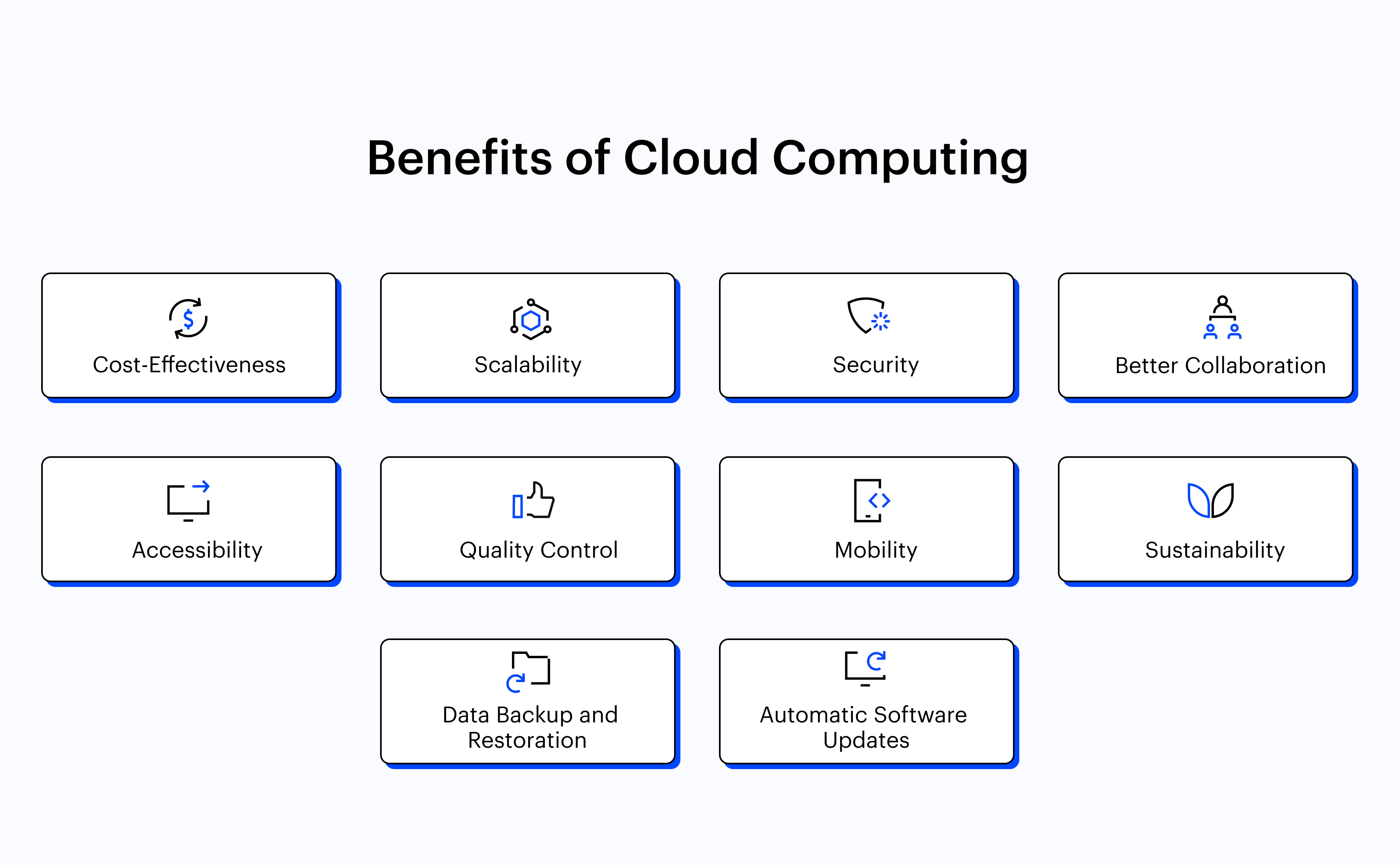Top 20 Advantages and Disadvantages of Cloud Computing

Cloud computing is pivotal in our daily lives, regardless of whether we are streaming a video on Netflix or accessing a cloud application such as Gmail. Businesses of all sizes have widely adopted cloud computing because staying competitive in this digital world is essential.
With the rise of big data, the ‘cloud’ has become the newest trend. A decade ago, it dealt with everything about storage and hosted SaaS applications, delivered via the cloud. Cloud computing is the next big thing—why? As more and more businesses with lesser granularity and budgets evolve, these require flexible solutions that quench their computing needs.
Moving to the cloud has transformed how we communicate, work, and collaborate—this is becoming a great necessity to stay ahead in today’s digital era. If you’re keen to move to cloud-based services, you need to learn the basics of cloud computing. You should also understand how it helps accelerate your digital transformation and the advantages and disadvantages of cloud computing. Let’s look at them in more detail.
What is Cloud Computing? An Interpretation
Breaking down the term ‘cloud computing', refers to the delivery of on-demand computing resources such as hardware, databases, storage, software, and networking to individuals and businesses via a network.
It enables businesses to access and store data without managing their IT infrastructure or physical devices. Since the data being created and shared continues to soar and consumers demand the quickest access to online services, cloud computing has become a go-to solution for businesses. This is especially true for tasks like outbound dialing, for instance, which benefits significantly from a cloud-based telephone dialing system due to its cost-effectiveness, seamless integration, and real-time data access
Similar to how you check your email inbox using a web browser, cloud computing lets companies access and manage resources or applications anywhere with Internet connectivity.
A third-party service provider usually manages and maintains cloud services, which enables IT teams to rapidly optimise storage and computing without paying infrastructure costs or managing more systems and applications.
You can opt for public, private, or hybrid cloud deployments and service models according to the control, flexibility, and management you demand. The three key types of cloud service models are:
- Infrastructure-as-a-Service (IaaS): Access to storage, computing, networking, and virtualisation on-demand.
- Platform-as-a-Service (PaaS): Hardware and software resources required to develop cloud applications.
- Software-as-a-Service (SaaS): Full-application stack as a cloud service, which encompasses maintenance and management from the base infrastructure to the application software.
Top Advantages and Disadvantages of Cloud Computing
Technology influences the way we live and work today. Whether we accept it or not, cloud computing contributes in some way or another to how we live today. Presently, organisations of all types and sizes use cloud computing.
While the benefits of cloud computing are many, it also has many hazards and drawbacks that you should not ignore. Let’s dive deep into the pros and cons of cloud computing in the upcoming sections:
Benefits of Cloud Computing

Cost-Effectiveness
Whichever cloud service model you opt for, you need to pay only for the resources you use. This lets you prevent overprovisioning or overbuilding the data centre. It helps your IT teams use valuable time to concentrate on more strategic work.
Scalability
Scalability is one of the best features of cloud computing. You can scale resources and storage to meet business requirements without investing in physical infrastructure. Companies need not pay for or build the infrastructure to bear the high load levels. They can also scale down quickly if resources are not being used.
Security
Despite popular perceptions, cloud computing can boost your security posture due to the breadth and depth of security features, centralised management, and automated maintenance. Reputed cloud providers also hire the best security experts and employ the best-advanced solutions to offer robust protection measures.
Better Collaboration
Cloud storage lets you make data accessible anywhere you are and at any time you demand it. Instead of being located at a specific place or device, people can access data from anywhere around the globe from any device, provided they have an internet connection.
Data Backup and Restoration
Cloud providers provide backup and disaster recovery features. Cloud data storage instead of local storage can help you prevent data loss during emergencies like malicious threats, hardware malfunctions, or a simple user error.
Automatic Software Updates
If you have much to get done and cannot manage the frequent software updates manually, fret not. One of the best benefits of cloud computing is that it provides automated software updates that users can refresh and install on their own.
Mobility
With cloud computing, businesses can access corporate data across every device. This means everyone stays in the loop every time. Any document or program stored in the cloud is quickly accessible to the user from any place with an Internet connection and device. Additionally, any employee or client with the system credentials can gain real-time access to any changes in the document.
Sustainability
Sustainability is not something for organisations to claim that they do their part in saving the planet. It demands solutions that consider wastefulness at each level of the business. Cloud hosting is highly environmentally friendly and results in a reduced carbon footprint. Cloud infrastructure offers environmental proactivity, powers virtual services rather than hardware, minimises paper waste, elevates energy efficiency, and reduces commuter-specific emissions.
Accessibility
Users can access data from anywhere in the world using an Internet connection. With access to information stored in the cloud, remote work, flexibility, and effectiveness in operations can be made possible.
Quality Control
By leveraging the advantages of cloud computing in Quality Assurance, organisations can improve efficiency and collaboration and make quality improvements in testing. This lets them adapt to the dynamic market requirements, deliver software quickly, and gain high-end customer satisfaction with reliable and robust products.
Wondering if cloud computing can benefit your business?
Learn MoreLoading...
Disadvantages of Cloud Computing
Downtime
Cloud service providers can encounter outages, which lead to the downtime of services that affect business operations. Scheduled maintenance by the cloud service providers can also result in the temporary unavailability of the service.
Potential Breaches
Security and privacy count as both advantages and disadvantages of cloud computing. While it boosts your organisation’s security posture with the help of experts’ support, the lack of appropriate cloud security measures can cause data leakage over cloud networks. This results in contract breaches, malware attacks, and intellectual property theft. Hackers can find out how businesses provide services to their end-users. This might result in a loss of business opportunities and a drop in revenue.
Vulnerability to Attacks
Private clouds are highly secure for businesses when dealing with data security. However, the cost of setting up private clouds is high compared to hybrid, public, and multi-clouds. Hence, various businesses opt for hybrid, public, and multi-cloud computing services. Since these clouds offer services to different users over the same network, businesses are susceptible to cyber attacks, which can result in data leakage or loss.
Vendor Lock-in
Vendor lock-in is a situation where companies that utilise the cloud computing services of a typical vendor become unable to switch to another vendor. This usually happens due to the high switching costs, huge amounts of data that are hard to migrate and various other complexities. Considering vendor lock-in, companies are forced to accept services from a specific vendor, which can affect their operational efficiency and workflow.
Cost Concerns
Cost counts as both an advantage and a disadvantage of cloud computing. While it supports small businesses to get quality services without spending huge amounts to manage IT infrastructure, it can also scale the expenditure for companies as it involves many hidden costs that could emerge at a later phase. This could be specific to cloud utilisation, data transfer, or data migration costs.
How to Overcome The Disadvantages of Cloud Computing?
Similar to any digital service, the disadvantages of cloud computing can be reduced or overcome completely. The lack of cloud experience and a relevant IT strategy makes it difficult to outweigh the drawbacks and overcome the disadvantages of cloud computing.
The following measures can help overcome the drawbacks of cloud computing:
1. Adopting a multi-cloud strategy
Downtime is a serious concern for businesses that adopt cloud computing. With a multi-cloud strategy in place, you can design a system that uses services from multiple providers. When one region undergoes an outage, the other keeps running. Offline functionality is another bonus that lets core applications function even with limited Internet connectivity. You can also set up robust backup systems or recovery plans that make sure the critical data is secure and can be restored immediately after the outage.
2. Ensuring data security
Third-party assurance reports help ensure your confidence in how the cloud service provider manages your data. As you grow more confident, eventually move more of your workloads to transition from a hybrid cloud model, in which your data gets stored in your own data centres and the public cloud, to a full-fledged public cloud model. Many governments that wish to keep sensitive defence data in their dedicated private data centres favour this approach.
3. Striking balance between cost and security
Maintaining a balance between cost and security in cloud computing demands expertise. A managed cloud service provider is important in this scenario. Conducting detailed security assessments of your selected cloud platform helps detect vulnerabilities; therefore, implementing robust security measures like access controls, encryption, and intrusion detection systems is important. Data isolation and segmentation reduce the potential impact of a breach in your information. Also, make sure that the cloud setup adheres to certain data privacy regulations, which helps with data protection and avoids possible fines or reputational damage. A cloud computing service company takes on the role of your security partner and keeps your data safe and compliant.
4. Optimisation of costs
A company might adopt measures to get tied to an uncompetitive vendor. However, there are several steps organisations can adopt to avoid this. The most important among these is deploying a multi-cloud solution. By spreading systems across different cloud platforms, moving among service providers will be highly feasible, presenting better opportunities. Using decoupled microservices architecture patterns with containers decouples development and deployment, enabling continuous integration and continuous delivery (CI/CD) for interoperability. By partnering with a cloud service company, you can identify optimisation strategies like optimised spending, reserved instances, and autoscaling that can help maintain an ideal budgeting decision.
5. Consider hiring a cloud computing services company
When the existing IT infrastructure lacks compatibility with cloud technology or appears highly complex to restructure, hybrid clouds can augment data deployment. A cloud computing service provider can help you glide through this transition and minimise the costs or time associated with technology and personnel for your business.
Final Note
At this point, it is evident that the advantages of cloud computing are endless. While there are limitations, the adoption of the right strategies, as mentioned in the blog, can help mitigate them. Factors such as reliability, flexibility, high performance, improved efficiency, and IT cost minimisation emphasise the importance of cloud computing for business.
It also fosters innovation and helps organisations earn faster time to market. Plus, it is necessary to remember that relying on your cloud journey requires the right approach that suits your business model. For example, many businesses refuse to switch to a cloud computing model and are confined to the capabilities of the present infrastructure without knowing what works best. If you’re considering adopting cloud computing services, cloud migrations, or looking for the best cybersecurity solutions for your cloud, the right cloud computing service provider can help you.
WAC has a team of experts, who offer top-notch cloud consulting, managed cloud services, cloud migration, security audit, and other cloud computing services to effectively manage your business journey. To learn more about the cloud services we provide, contact us today!

Need professional cloud computing solutions?
Empowering businesses with advanced cloud services for limitless growth and efficiency
Discover Digital Transformation
Please feel free to share your thoughts and we can discuss it over a cup of tea.










